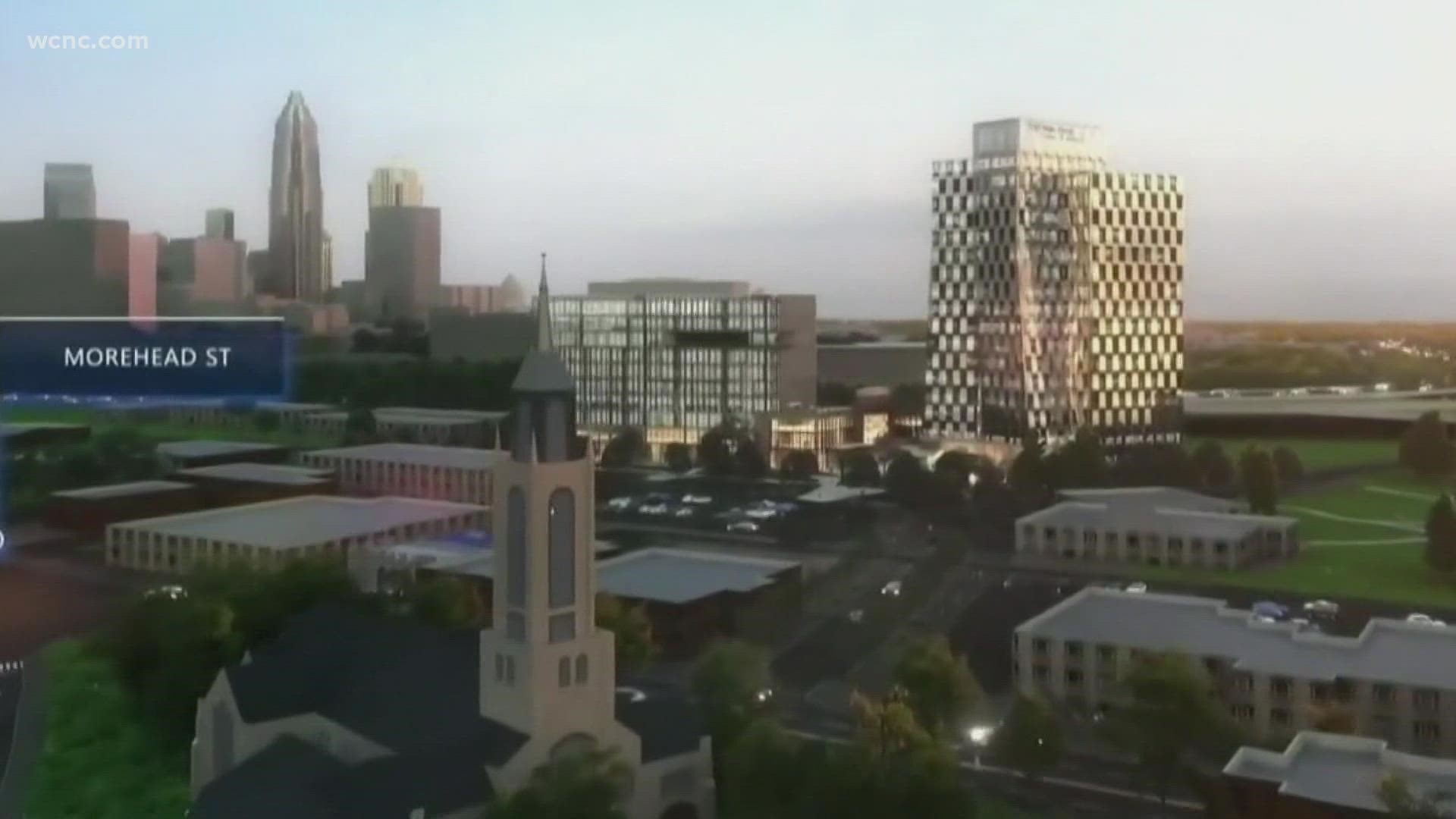CHARLOTTE, N.C. — Charlotte's first medical school will come with a hefty price tag to taxpayers as hospital and county leaders hope to create an 'Innovation District' in the Midtown and Dilworth area.
Renderings of what would become Wake Forest School of Medicine near Pearl Street Park were shown to Mecklenburg Board of County Commissioners Tuesday night in a presentation by Atrium Health CEO Eugene Woods.
The project would need public support from taxpayers, according to the county.
Mecklenburg County Economic Development Director Peter Zeiler said the latest estimate would cost taxpayers $75 million. That could be split between Mecklenburg County and the City of Charlotte.
Zeiler said worst-case scenario, the county could pay $50 million over 20 years that they'd be reimbursed for by the taxes brought in from the project.
"This is the most exciting thing to happen in Mecklenburg County since the expansion of the Charlotte Airport," Zeiler said.
The renderings showed multiple buildings just outside of Uptown. Woods said the heart of the development would be the medical school, with other space built out for national health-tech and medical innovation companies to work out of.


"You're bringing thousands of jobs to the region, and many, many middle-skilled jobs," said Commissioner Leigh Altman, excited about what the district would bring to the community.
"I'm anxious to see this happen," added Commissioner Vilma Leake.
Commissioner Pat Cotham noted she'd always wondered when a medical school would be built in the Queen City -- the largest U.S. city without a four-year medical school.
"This is definitely an exciting project," Cotham told Woods and the rest of the board.
Woods noted that it would be more than just an education hub. It would also give people in the community opportunities in different fields of work and education that they don't currently have.
However, some commissioners pushed for more information on just how the community would benefit in that regard.
"I'm cautiously optimistic," said Commissioner Mark Jerrell, who wanted more details on how local residents would have opportunities at the school and jobs created.
"I have guarded optimism," Commissioner Susan Rodriguez McDowell added.
"I think that investing in our community, investing in our people is the right thing to do," she added. "I do feel a little bit concerned about investing in a part of town that probably needed our investment the least."
The district would be built near Atrium Health Carolinas Medical Center in between Dilworth and Midtown, a historically wealthy area already congested.
"Why is this innovation located in the best place for Atrium and not the best place for the community," she asked, rhetorically.
Board Chair George Dunlap reminded commissioners several details will soon be ironed out.
"This is the beginning of the process, but it's going to be accelerated because of the timeline," Dunlap said.
Atrium Health hopes to have the first students seated at the medical school in 2024.
Atrium Health issued the following statement to WCNC Charlotte:
"The construction of a second campus of Wake Forest School of Medicine is among the biggest things to happen in Charlotte in years. It has continued to build excitement within the community and promises to reshape the landscape of medical education through innovation, technology and diversity, among others. A key component of the impact of the Wake Forest School of Medicine – Charlotte campus will be the innovation district that will build up around it. This will shift the local industry landscape as we incubate, develop and scale life science businesses into the companies of Charlotte’s future.
We are grateful for the opportunity to present to the commissioners and to the council about how we can shape the future of Charlotte. Atrium Health will be making substantial investment of over $1.1 billion into bringing an innovation district that will be adjacent to the second campus of Wake Forest School of Medicine in Charlotte. The innovation district will be an economic boon for years to come as research and development firms relocate or are created here. The proposed tax increment grant would be a major component of our ability to ensure the necessary infrastructure improvements are in place to support the development, such as water, sewer and traffic flow. And, as a result, we will be able to create and facilitate an improved tax base through site development, new jobs and building affordable housing to help support the growth that the school of medicine and innovation district will bring with it.
Over the next 15 years or so, we expect the innovation district to create roughly 11,500 jobs in and around the district. Innovation jobs typically provide a 15% higher entry level wage, and we expect that 30-40% of the jobs created onsite won’t require a bachelor’s degree, so this project is truly a gateway to opportunity for all.
We don’t have additional details to share at this time, beyond what was shared with the commission. We look forward to being able to share more as the project unfolds about who and what is coming and how that will help our community grow and improve health, hope and healing for all."
Contact Hunter Sáenz at hsaenz@wcnc.com and follow him on Facebook, Twitter and Instagram.

